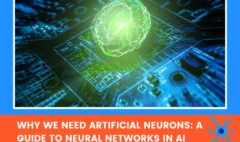The Ethical Challenges of Generative AI
The Ethical Challenges of Generative AI
We can’t imagine the possibility that machines can create their art and stories, make music, or even cook up realistic videos out of the blue, which really sounds too good to be true, isn’t it? But that is what generative AI does. Actually, it presents algorithms that look and feel human-made—it would never cross one’s mind while in deep thought to see that stuff for real. Literally, the possibilities of this technology are boundless, but on the other side, it is a concern for quite a handful of ethical issues. We can go through the challenges that are brought on by generative AI, and know more about the reason as to why it should be handled.
What is Generative AI?
Generative AI is a system such as ChatGPT or DALL·E that can produce new content inspired by the training data from which it has been generated. Unlike general data-crunching systems of the past, such AI can be taught to learn from patterns present within the dataset and then use these patterns as tools to construct quite original things-that is, to write Stories, Articles, Essays, Code And similarly for generating sounds, images, and ultimately, videos as well as, deepfake videos & images etc.
1.Deepfakes and Fake Content
The biggest problem is AI-generated deepfakes. There are videos and images of people doing or saying things they never said or did
Why is this a problem?
- Deepfake contents can arise from the problem of missinformation and fake news.
- They can ruin people’s reputation and identity theft
- In some cases, they have been used maliciously in political propaganda or cyberbullying.
2. Copyright and Ownership Issues
Generative AI uses open source data to learn from available data, usually from copyrighted data like books, art and music. In this way, the data they learned from is also, not infrequently, the largest single source of inspiration for new content they generate.
Key questions:
- Who owns new content eventually created by the AI? ,Is it the developer or the user, or is it the original content creators who own it?,
- Is it fair in the context of intellectual property rights to use copyrighted material without permissions and consent specifically for training AI models?
This question itself creates tension between AI developers and content creators because it goes unresolved beyond the question.
3. Bias in AI Outputs
The generative AI models are as good as the training data are excellent. Without software, its own source data input is just what it learns from some biases within the training data.
Real-life examples are seen in terms of
- Some AI-generating imagery that put into communities with stereotypes;
- Textual AI creating inappropriate language.
It creates ethical concerns about the fairness and inclusivity of the content created by AI.
4. Job Displacement and Creativity
One reason why generative AI is termed transformative is that it can practically perform many of the tasks that can be performed by human beings.
Job loss: Will AI replace creative professionals like Writing, designing, and even coding could be part of experiences that a proficient generative model could generally realize. That is on top of any increase in our ability to achieve more productivity.
Devaluation of creativity: Will AI be able to replace creative professionals like artists, writers, and graphic designers? If Gen AI, by virtual means, creates art, has human creativity completely lost its price? Balancing innovation with the protection of social roles is somewhat the most challenging.
5. Privacy Concerns
The required amount of data is often very high for accessing generational AI. It will disturb
Data misuse: Data is not the only negative aspect of generative AI. Sometimes personal or highly sensitive information will be used to train certain models without consent.
Privacy violation: Outputs generated by AI could contain a significant fraction that is embarrassingly personal or extremely sensitive. That anxiety might be alleviated if the right to data use of the gathered data is ensured and if a true consent was obtained.
How Can We Address These Problems & Challenges?
Here are a few steps & regulations that can be taken to address the concerns regarding ethical and generative art through AI:
- Establish Regulation: Governments and authorities could set laws to supervise the AI usage, ensuring fairness and liability.
- Promote Transparency: An AI developer should tell which method is being used in training the models, the dataset is being used, and the generated output.
- Encourage Ethical AI Design: So that the bias could mainly be eradicated, respecting copyright, and protecting the privacy of any stakeholders.
- Educate the Users Awareness: Let people really know what it means for generative AI to be put to evil use.
Conclusion: Balancing Innovation and Responsibility
Superb evolution in generative AI with serious issues is quite visible in the future. Misused, biased, as well as data privacy, are some of the primary concerns that will ensure the responsible use of generative AI .
At SkillzRevo, our commitment is to help learners become knowledgeable and practically relevant in the AI world. Check out our AI and data science programs and prepare for a better future.









